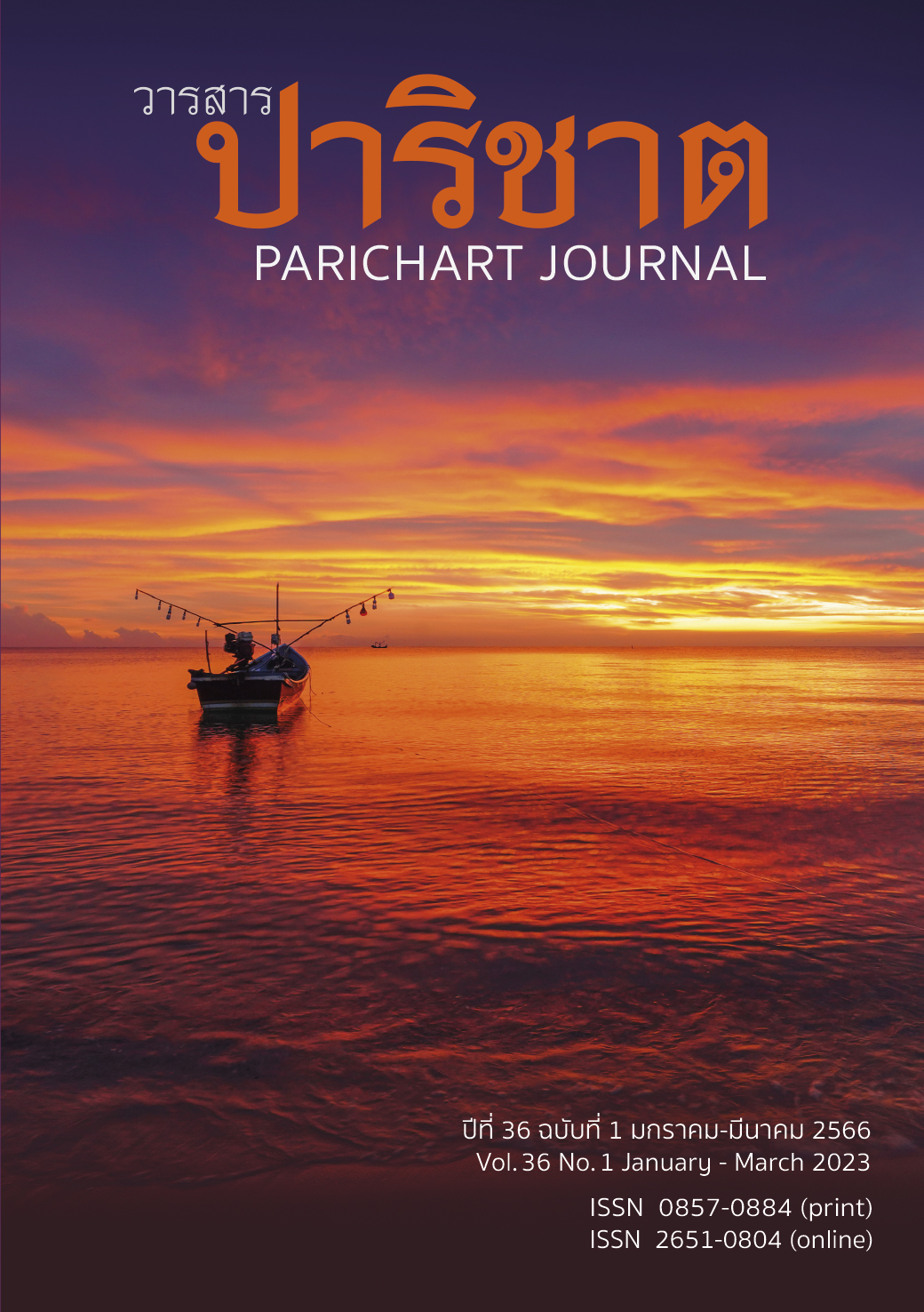ความเป็นพลเมืองกับประชาธิปไตยชุมชน: การวิเคราะห์ปัจจัยและความสัมพันธ์เชิงเหตุและผล
Main Article Content
บทคัดย่อ
วัตถุประสงค์ของงานวิจัย คือ เพื่อวิเคราะห์ปัจจัยเชิงยืนยันของความเป็นพลเมืองและประชาธิปไตยชุมชน และอธิบายความสัมพันธ์เชิงเหตุและผลระหว่างความเป็นพลเมืองกับประชาธิปไตยชุมชน โดยศึกษาจากประชาชนที่อาศัยอยู่ในหมู่บ้านใน 76 จังหวัดของประเทศไทย ไม่รวมกรุงเทพมหานคร การสุ่มตัวอย่างใช้วิธีการสุ่มแบบหลายขั้นตอน จำแนกออกเป็นภาค จังหวัด อำเภอ ตำบล และหมู่บ้าน ตามลำดับ โดยจะเลือกบุคคลที่อาศัยอยู่ในหมู่บ้านมาเป็นกลุ่มตัวอย่างสำหรับการศึกษา รวมตัวอย่างทั้งหมดเท่ากับ 8,800 คน ข้อมูลเก็บรวบรวมโดยใช้แบบสอบถามที่ผ่านการทดสอบความเชื่อถือได้ การวิเคราะห์ข้อมูลใช้การวิเคราะห์ปัจจัยเชิงยืนยัน และการวิเคราะห์ถดถอยพหุ ผลการวิจัยจากการวิเคราะห์ปัจจัยเชิงยืนยันอันดับที่ 2 พบว่า ข้อมูลเชิงประจักษ์ของความเป็นพลเมืองและประชาธิปไตยชุมชนที่เก็บรวบรวมจากกลุ่มตัวอย่างจะสอดคล้องกันกับองค์ประกอบของความเป็นพลเมืองและองค์ประกอบของประชาธิปไตยชุมชนที่ประมวลได้เชิงทฤษฎี และผลการวิจัยโดยใช้การวิเคราะห์ถดถอยพหุที่นัยสำคัญทางสถิติระดับ 0.05 พบว่า ปัจจัยของความเป็นพลเมืองที่มีอิทธิพลต่อทั้งประชาธิปไตยชุมชนและองค์ประกอบของประชาธิปไตยชุมชนมากที่สุด ได้แก่ พลเมืองที่มีความรับผิดชอบในตนเอง รองลงไป ได้แก่ พลเมืองที่ใส่ใจในความยุติธรรม จิตสาธารณะ พลเมืองที่เข้าไปมีส่วนร่วม คารวธรรม ปัญญาธรรม และนิติธรรม ตามลำดับ
Article Details

อนุญาตภายใต้เงื่อนไข Creative Commons Attribution-NonCommercial-NoDerivatives 4.0 International License.
เอกสารอ้างอิง
Nelson, M. H. (2002). Thailand: Problems with decentralization? In M. H. Nelson (Ed.). Thailand’s new politics: KPI yearbook 2001. King Prajadhipok’s Institute and White Lotus Press.
Haque, M. S. (2010). Decentralizing local governance in Thailand: Contemporary trends and challenges. International Journal of Public Administration, 33(12-13), 673-688.
Freedom House (2019). Freedom in the world 2019: The annual survey of political rights & civil liberties. Rowman & Littlefield Publishing Group.
Donovan, T., & Karp, J. A. (2006). Popular support for direct democracy. Party Politics, 12(5), 671-688.
Zittel, T., & Fuchs, D. (Eds). (2007). Participatory democracy and political participation: Can participatory engineering bring citizens back in?. Routledge.
Sintomer, Y., Herzberg, C., & Röcke, A. (2008). Participatory budgeting in Europe: Potentials and challenges. International Journal of Urban and Regional Research, 32(1), 164–78.
Blakeley, G. (2010). Governing ourselves: Citizen participation and governance in Barcelona and Manchester. International Journal of Urban and Regional Research, 34(1), 130–45.
Creighton, J. L. (1992). Involving citizens in community decision making: A guidebook. Program on Community Problem Solving.
Bulmer, E. (2017). Local democracy. International IDEA.
Vatanasapt, V. (2003). Public participation in Thailand: Country trends on development and public participation. In K. J. Haller & P. Siroros (Eds.). Legal foundations for public consultation in government decision-making (pp. 65 – 82). Kobfai Publishing.
Laothamatas, A. (2010). Community democracy: Political science for community organizations councils. Community Organizations Development Institute.
Laothamatas, A. (2011). Citizen politics. King Prajadhipok's Institute.
McCargo, D. (2002). Reforming Thai politics. Nordic Institute of Asian Studies.
Campbell, D., Hess, F., & Levinson, M. (Eds). (2012). Making civics count: Citizenship education for a new generation. Harvard Education Press.
Levinson, M. (2012). No citizen left behind. Harvard University Press.
Acemoglu, D., & Robinson, J. A. (2012). Why nations fail: The origins of power, prosperity and poverty. Crown Publishers.
Tantisunthorn, T. (2015). Civic education for Thai society. Institute of Public Policy Studies.
Pholphet, P. (2004). A research project on monitoring and evaluating the enforcement of the constitution on rights, liberties and human dignity. Chulalongkorn University.
Eawsriwong, N. (2017). Patronage system in Thai politics. Matichon Weekly Magazine, June 23-29.
Bunmi, T. (2004). Civil society. Saithan.
Wasi, P. (2007). Community democracy: The foundation of solidarity politics and moral politics. National Health Foundation.
Prasertkul, S. (2010). People’s politics in Thai democracy. Viphasa.
Tocqueville, Alexis de (2000). Democracy in America. University of Chicago Press.
Mill, J. S. (1975). Three essays: On liberty, representative government, the subjection of women. Oxford University Press.
Held, D. (1986). Model of democracy. Polity Press.
Mathews, D. (1998). Politics for people: Finding a responsible public voice. University of Illinois Press.
Ostrom, E. (1990). Governing the commons: The evolution of institutions for collective action. Cambridge University Press.
Sen, A.K. (1999). Development as freedom. Knopf press.
Heater, D. (1990). Citizenship: The civic ideal in world history, politics and education. Longman.
Hill, D. M. (1994). Citizens and cities. Harvester.
Reich, H. (2006). Local ownership in Conflict Transformation Projects. Berlin: Bergh of Research Center for Constructive Conflict Management.
UNDP. (2008). Capacity development: Empowering people and institutions. United Nations Development Programme.
Bhikkhu P.A. Payutto (Somdet Phra Buddhaghosacariya) (2017). Buddhadhamma: The laws of nature and their benefits to life. Sahadhammika.
Dworkin, R. (1977). Taking rights seriously. Duckworth.
Phelan, Shane. (2001): Sexual strangers: Gays, lesbians and dilemmas of citizenship. Temple University Press.
Honohan, I. (2002). Civic republicanism. Routledge.
Faulks, K. (2000). Citizenship. Routledge.
Westheimer, J., & Kahne, J. (2004). What kind of citizen? The politics of educating for democracy. American Educational Research Journal, 41(2), 237–269.
Bourdieu, P. (1984). Distinction: A social critique of the judgment of taste. (R. Nice, Trans.). Harvard University Press.
Bellah, R. N, Madsen, R., Sullivan, W. M., Swidler, A., & Tipton, S. M. (2008). Habits of the heart: Individualism and commitment in American life. University of California Press.
Verba, S., Schlozman, K. L., & Brady, H. E. (1995). Voice and equality. Harvard University Press.
Egan, K. (1997). The educated mind: How cognitive tools shape our understanding. University of Chicago Press.
Almond, G., & Verba, S. (1989). The civic culture. Sage.
Hansen, P. B. (1993). Hannah Arendt: Politics, history and citizenship. Stanford University Press.
Etzioni, A. (1994). The spirit of community: The reinvention of American society. Simon & Schuster.
Putnam, R. D. (1993). Making democracy work: Civic traditional in modern Italy. Princeton University.
Uwanno, B. (2011). Special Keynote on Closing the Academic Conference on Citizenship and the Future of Thailand. In Academic Conference Papers of KPI Congress 13th. Bangkok: King Prajadhipok's Institute.
Samkoset, V. (2011). Civic education. Matichon, March 3.
Thaewanarumitkul, P. (2012). Civic education. Nanmeebooks.


